Maximizing the use and impact of the UK’s longitudinal research data
By Blog Editor, IOE Digital, on 24 January 2023

Credit: alice_photo via Adobe Stock.
24 January 2023
By Rob Davies
As CLOSER marks its 10-year anniversary, we’re looking back over the evolution of the home of longitudinal research in the UK.
The studies
The UK funds a number of internationally renowned longitudinal population studies (LPS). Each tracks a large sample of individuals over a number of years. In some cases they follow cohorts of around 17,000 born in the same year, from cradle to grave. In others, they follow a cohort for a shorter period, and the sample may be defined by age and/or, for instance, where these individuals live or work. The data this generates have been invaluable for analysing social as well as biomedical research questions and informing policy. The primary funders are the Economic and Social Research Council (ESRC) and Medical Research Council (MRC).
Each of the studies is powerful in itself, but the LPS community were more ambitious still, looking to amplify the insights they could provide by combining the data they generate. Read the rest of this entry »
Reception Baseline Assessment, algorithmic bias and the reification of ‘ability’
By Blog Editor, IOE Digital, on 17 January 2023

Credit: Phil Meech for UCL IOE.
17 January 2023
By Guy Roberts-Holmes and Lucy Kaufmann
The Department for Education (DfE) had attempted to introduce its contested and controversial Reception Baseline Assessment (RBA) for four-year-olds since 2015. Reflecting a wider realisation of the COVID-19 pandemic as a powerful catalyst for ‘re-imagining’ education with digital education technologies, the DfE implemented RBA as a statutory assessment in September 2021. Read the rest of this entry »
Counting the benefits of mandatory Maths – and how to avoid making skills inequalities worse
By Blog Editor, IOE Digital, on 11 January 2023

Credit: Phil Meech for UCL.
11 January 2023
By Andy Green and Neil Kaye
If nothing else, Sunak’s recently announced plan for all students in England to study Maths to age 18 generated a rich crop of maths related puns in the media. Our analysis shows the plan should be welcomed, at least in principle, as a long-overdue reform – but also how implementing such a policy without the requisite strategic and financial backing would likely lead to wider skills gaps and a worsening of the inequalities already seen amongst young people leaving upper secondary education.
England is amongst a small minority of OECD countries which do not require the study of either Maths or the national language throughout upper secondary education (ages 16-18) (the others being Australia, New Zealand, Ireland and the other UK nations). Furthermore, less than half of students in post-16 education study Maths as a discreet subject, many of them instead on courses to re-take GCSE Maths, in which only 20 per cent passed at grade Read the rest of this entry »
IOE Blog in 2022: an age of anxiety with glimmers of hope
By Blog Editor, IOE Digital, on 3 January 2023

Credit: Startup Stock Photos
3 January 2023
By Diane Hofkins
Few of us will have been sad to see the end of the year 2022, and yet, throughout the year, our IOE writers sought to make things better. They analysed findings on topics from dyscalculia to climate change to exams to international development and proposed ways forward.
Take for example Sandra Leaton Gray and Andy Phippen’s helpful February post about children and internet safety, with its down to earth advice on listening to children and talking through concerns and its reassurance that most children use the internet safely. This post also featured my favourite illustration of the year (see above). Or Katya Dowdle’s debate-provoking proposals for more oral exams in higher education (HE). For Read the rest of this entry »
Giving voice to the under-served: how can we mitigate the Pandemic’s impact on people from minoritised groups who have disabilities or chronic conditions?
By Blog Editor, IOE Digital, on 15 December 2022

CICADA Stories, Bloomsbury Theatre
15 December 2022
By Carol Rivas, Amanda Moore, Kusha Anand, Alison Wu and Ozan Aksoy
This post is adapted from a blog for Biomed Central.
Even before the pandemic, many people with chronic conditions or disabilities, particularly those from minoritised ethnic groups, faced obstacles in accessing or utilising networks of support, health and social care. During the pandemic, some of these obstacles increased disproportionately, and widened the inequalities gap.
Now, during Disability History Month (16 November to 16 December), it is instructive to consider the interplay of different intersecting factors that compromise good health outcomes when considering inequalities. For example, chronic conditions such as diabetes and cardiovascular disease increase vulnerability to COVID-19 and are disproportionately Read the rest of this entry »
IOE at 120: the mission to transform education and society continues, 2012–22 and into the future
By Blog Editor, IOE Digital, on 8 December 2022
 8 December 2022
8 December 2022
By Emma Wisby
This is the last in a series of 12 blogs exploring each decade in IOE’s history in the context of the education and society of the times. Find out more about our 120th anniversary celebrations on our website, and follow us on Twitter, Instagram, Facebook and LinkedIn to keep up with everything that’s happening.
It is important for an organization to have a sense of its history, to take opportunities to reflect on that journey as well as celebrate its contributions and achievements. That is what we have been doing this year at IOE, as it marks its 120th anniversary. It has been an opportunity to recognize the many individuals and organizations that have been a vital part of IOE’s impact. Central to this has been the IOE at 120 blog series, which in this piece we draw together and bring to the present day.
As the series has conveyed, organizationally IOE has taken many different forms:
- from elementary teacher training college for London with just 58 students,
- to the Area Training Organization for London, overseeing some 30 teacher education colleges,
- and back to a single entity; from one of England’s esteemed ‘mono-technics’ or ‘specialist institutions’, alongside the likes of the London School of Hygiene and Tropical Medicine and Royal College of Art,
- to a world-leading faculty within UCL.
In parallel, we see IOE’s influence on the field of education studies and then, over more recent decades, related areas of social science and the arts Read the rest of this entry »
Dyscalculia: how to support your child if they have mathematical learning difficulties
By Blog Editor, IOE Digital, on 6 December 2022

Credit: Pexels / Pixabay
6 December 2022
By Jo Van Herwegen, Elisabeth Herbert and Laura Outhwaite
A good grasp of maths has been linked to greater success in employment and better health. But a large proportion of us – up to 22% – have mathematical learning difficulties. What’s more, around 6% of children in primary schools may have dyscalculia, a mathematical learning disability.
Developmental dyscalculia is a persistent difficulty in understanding numbers which can affect anyone, regardless of age or ability.
If 6% of children have dyscalculia, that would mean one or two children in each primary school class of 30 – about as many children as have been estimated to have dyslexia. But dyscalculia is less well known, by both the general public and teachers. It is also less well researched in comparison to other learning difficulties.
Children with dyscalculia may struggle to learn foundational mathematical skills and concepts, such as simple counting, Read the rest of this entry »
IOE at 120: a leader of leaders in a time of recognition and pressure, 2002–12
By Blog Editor, IOE Digital, on 29 November 2022
 29 November 2022
29 November 2022
This blog is the 11th in a series of 12 exploring each decade in IOE’s history in the context of the education and society of the times. Find out more about our 120th anniversary celebrations on our website, and follow us on Twitter, Instagram, Facebook and LinkedIn to keep up with everything that’s happening.
IOE’s influence grew during the first decade of the twenty-first century, under the directorship of Professor Geoff Whitty (2000-10). The Institute was well-placed to benefit from the ruling New Labour government’s (1997-2010) interest in education. Ministers supported the need for educational research to inform policy and practice and relationships with policy-makers were actively cultivated. While relations with the Coalition Government (2010-15) were less smooth, the Institute sustained good levels of funding and activity.
IOE also expanded on the world stage during this period, as the post-Cold War impetus for globalisation and collaboration took hold. The Institute fared well in newly-developed national and international league tables. ‘In both research and teaching, the Institute gained prestige from these metrics and established many new research centres that responded to the renewed Read the rest of this entry »
Friends, family, colleagues, and neighbours play a vital role in responding to domestic abuse
By Blog Editor, IOE Digital, on 23 November 2022
23 November 2022
By Karen Schucan Bird, Carol Rivas, Martha Tomlinson, Nicola Stokes, Patricia Melgar Alcantud, Maria Vieites Casado
Friday 25 November marks the start of 16 Days of Activism against Gender-Based Violence and we reflect on the crucial role that we, as colleagues, friends, family, or community members, can play in responding to domestic abuse. Women who experience abuse may tell someone within their familial or social network about their situation. Since estimates suggest that one in three women experience abuse in their lifetime, many of us will be the person told and our response can be vital. Evidence suggests that supportive reactions from friends and family can improve the wellbeing of victims and support further help-seeking.
The pandemic highlighted the crucial role that friends, family and colleagues can play. But research tells us that there are Read the rest of this entry »
Climate change education: what happened at COP27 and what happens next?
By Blog Editor, IOE Digital, on 23 November 2022

Photo: UNFCC via Creative Commons
23 November 2022
By Kate Greer and Nicola Walshe, Centre for Climate Change and Sustainability Education (CCCSE)
So, how was COP?
Good…? Exhausting…? Productive…? Challenging…?
It is difficult to sum up the experience of attending the annual UN Climate Change Conference of the Parties, or COP. COP can be heartwarming and heartbreaking. It can leave you feeling determined and despairing. Motivated and overwhelmed. Fearful and hopeful. All at the same time. Intertwined with the tangle of feelings that we bring home from our experience at COP27 in Sharm El-Sheikh, Egypt, one thing is (relatively) clear. This year, COP27 resulted in good news for education. Through an immense collaborative effort of Member Parties and Observers, progress was made towards implementing an internationally coordinated educational response to climate change. Here, we briefly reflect on this achievement and its implications for climate change education in England and further afield.
Of foremost importance for education is that at COP27 countries agreed to a new global Action Plan on Action for Climate Empowerment, or ACE. ACE is the term used to describe a broad area of work set out in the United Nations Framework Convention on Climate Change (1992) and the Paris Agreement (2015) which includes education alongside five other elements: Read the rest of this entry »
 Close
Close


